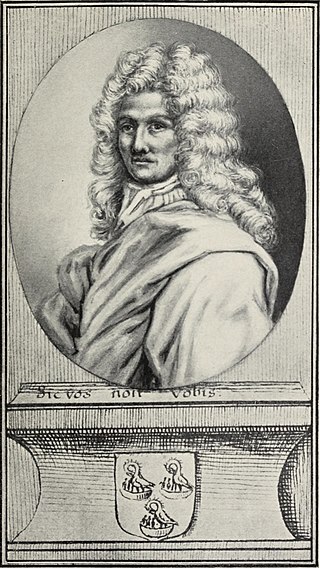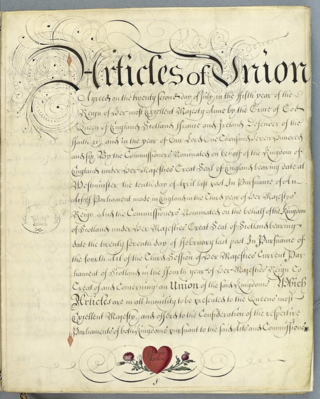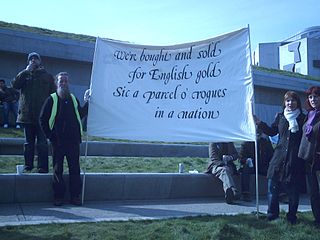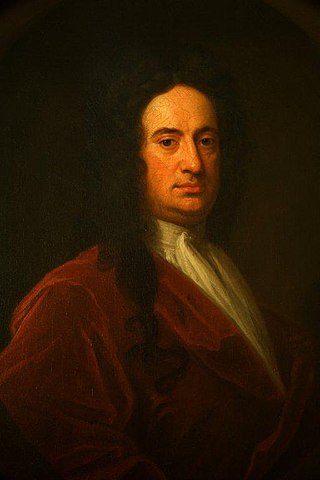Related Research Articles

Sir William Paterson was a Scottish trader and banker. He was the founder of the Bank of England and was one of the main proponents of the catastrophic Darien scheme. Later he became an advocate of union with England.

The Company of Scotland Trading to Africa and the Indies, also called the Scottish Darien Company, was an overseas trading company created by an Act of the Parliament of Scotland in 1695. The Act granted the Company a monopoly of Scottish trade to India, Africa and the Americas, extraordinary sovereign rights and 21 years of exemptions from taxation.

The Treaty of Union is the name usually now given to the treaty which led to the creation of the new state of Great Britain. The treaty united the Kingdom of England and the Kingdom of Scotland to be "United into One Kingdom by the Name of Great Britain". At the time it was more often referred to as the Articles of Union.

David Boyle, 1st Earl of Glasgow was a Scottish politician and peer. He was the last Treasurer-depute before the Union with England.

Adam Cockburn, Laird of Ormiston, Lord Ormiston, was a Scottish administrator, politician and judge. He served as Commissioner for Haddington Constabulary in the parliaments of 1681-2 and 1689, and in the conventions of 1678 and 1689. He was appointed Lord Justice Clerk on 28 November 1692.
Events from the year 1698 in the Kingdom of Scotland.

"Such a Parcel of Rogues in a Nation" is a Scottish folk song whose lyrics are taken from a poem written by Robert Burns in 1791, listed as number 5516 in the Roud Folk Song Index. It has continued to be associated with Scottish nationalism and also been referenced in other situations where politicians' actions have gone against popular opinion.

Greyfriars Kirkyard is the graveyard surrounding Greyfriars Kirk in Edinburgh, Scotland. It is located at the southern edge of the Old Town, adjacent to George Heriot's School. Burials have been taking place since the late 16th century, and a number of notable Edinburgh residents are interred at Greyfriars. The Kirkyard is operated by City of Edinburgh Council in liaison with a charitable trust, which is linked to but separate from the church. The Kirkyard and its monuments are protected as a category A listed building.
James Foulis of Colinton, Lord Retfurd or Redford, was a Scottish judge and politician. He was one of the main investors in the Company of Scotland and their Darien Expedition.
Sir Robert Steuart, 1st Baronet of Allanbank was a Scottish politician who represented North Berwick in the Parliament of Scotland from 1698 to 1702.

George Baillie was a Scottish politician who sat in the Parliament of Scotland from 1691 to 1707 and in the British House of Commons from 1708 to 1734.
Sir John Swinton of Swinton sometimes called John Swinton of that Ilk was a Scottish politician.
Robert Blackwood of Pitreavie (1624–1720) was a 17th century Scottish silk merchant who served as Lord Provost of Edinburgh from 1711 to 1713.
Sir Patrick Johnston (1650–1736) of Edinburgh was a Scottish merchant and politician who sat in the Parliament of Scotland from 1702 to 1707 and as a Whig in the British House of Commons between 1707 and 1713. He was Lord Provost of Edinburgh three times from 1700 to 1702, from 1704 to 1706, and from 1708 to 1710.
Sir Robert Chieslie of Dalry was a Scottish merchant who served as Lord Provost of Edinburgh from 1694 to 1696.

Robert Corseof Corse (1639–1705) was a 17th-century Scottish merchant who traded sugar and tobacco in Glasgow and was a Baillie and Dean of Guild of the City Council. He lost a fortune due to his involvement in the Company of Scotland.

Francis Montgomerie of Giffen, Ayr was a Scottish politician who sat in the Parliament of Scotland from 1689 to 1707 and in the British House of Commons from 1707 to 1710.
Sir Archibald Muir or Mure of Thornton (c.1640–1701) was a Scottish merchant who served as Lord Provost of Edinburgh from 1696 to 1698.

Andrew Hume, Lord Kimmerghame MP (1676–1730) was a Scottish judge and Senator of the College of Justice. He also held several politic roles including member for Kirkcudbright.
References
- ↑ "Berwickshire | History of Parliament Online". www.historyofparliamentonline.org.
- ↑ "The Darien Scheme". Historic UK.
- ↑ "Sir George Home of Kello, Kt". geni_family_tree.
- ↑ Burke's Peerage: Earls of Lindsay
- ↑ The Universal Scots Almanac 1773